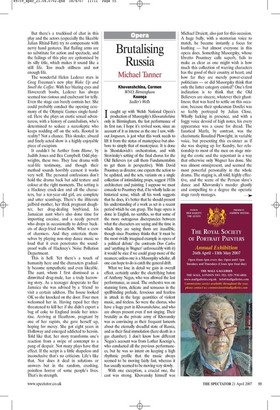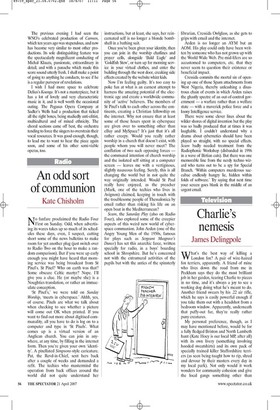Brutalising Russia
Michael Tanner
Khovanshchina, Carmen WNO, Birmingham Koanga Sadler’s Wells Icaught up with Welsh National Opera’s production of Musorgsky’s Khovanshchina only in Birmingham, the last performance of its first run. I hope it’s revived soon, since an account of it as intense as the one I saw, without longueurs, is just what this work needs to lift it from the status of masterpiece-but-alsobore to simply that of masterpiece. It is done in Shostakovich’s orchestration, and with Stravinsky’s setting of the final chorus for the Old Believers (or call them Fundamentalists to get them in perspective). With David Pountney as director, one expects the action to be updated, and the sets, variants on a single collection of intimidating props, suggest 1920s architecture and painting. I suppose we must concede to Pountney that, if he wholly lacks an historical sense, which all his work suggests that he does, it’s better that he should present his understanding of a work as set in a recent period which he can grasp. The huge opera is done in English, no surtitles, so that some of the more outrageous discrepancies between what the characters are saying and the time in which they are saying them are inaudible, though since Pountney thinks that ‘it must be the most vividly imagined example in opera of a political debate’ (he contrasts Don Carlos and ‘anything in Wagner’ unfavourably with it) it would be nice if we could grasp more of the nuances; unless one is a Musorgsky scholar, all one can hope to do is catch the general drift.
What we lose in detail we gain in overall effect, certainly under the electrifying baton of Anthony Negus, who was allowed the last performance, as usual. The orchestra was on stunning form, delicate and sensuous in the spellbinding prelude, ferocious and fearless in attack in the large quantities of violent music, and tireless. So were the chorus, who have a huge part in Khovanshchina, and who are always present even if not singing. Their brutality as the private army of Khovansky was as convincing as their frequent laments about the eternally dreadful state of Russia, and as their final immolation (here death in a gas chamber). I don’t know how different Negus’s account was from Lothar Koenigs’s, who conducted all the previous performances, but he was so intent on keeping a high rhythmic profile that the music always seemed to be moving fairly fast, whereas it has usually seemed to be moving very slowly.
With one exception, a crucial one, the cast was strong. Khovansky himself was Michael Druiett, also just for this occasion. A huge bully, with a stentorian voice to match, he became instantly a focus for loathing — but almost everyone in this opera does. Something Musorgsky, whose libretto Pountney calls superb, fails to make as clear as one might wish is how much this collection of warring characters has the good of their country at heart, and how far they are merely power-crazed politicians — or did Musorgsky think that only the latter category existed? One’s first inclination is to think that the Old Believers are sincere, whatever their ghastliness; that was hard to settle on this occasion, because their spokesman Dosifei was so feebly portrayed by Julian Close. Wholly lacking in presence, and with a foggy voice devoid of high notes, his every appearance was a cause for dread. The fanatical Marfa, by contrast, was the charismatic Rosalind Plowright, in variable voice, but presenting this ex-sinner as if she was shaping up for Kundry, her relationship to most of the men on stage mixing the erotic and the repentant in a way that otherwise only Wagner has done. She was almost omnipresent, and seemed the most powerful personality in the whole drama. The staging is, all told, highly effective, and the scene of the Persian slave’s dance and Khovansky’s murder ghastly and compelling to a degree the operatic stage rarely manages. The previous evening I had seen the WNO’s celebrated production of Carmen, which ten years ago was stupendous, and now has become very similar to most other productions. Its sole distinguishing feature was the spectacularly magnificent conducting of Michal Klauza, passionate, extraordinary in detail, and with a panache which made this score sound utterly fresh. I shall make a point of going to anything he conducts, to see if he is a regular purveyor of revelations.
I wish I had more space to celebrate Delius’s Koanga. It’s not a masterpiece, but it has a lot of lovely and very characteristic music in it, and is well worth the occasional outing. The Pegasus Opera Company at Sadler’s Wells had a production that ticked all the right boxes, being studiedly anti-elitist, multicultural and of mixed ethnicity. The choral sections came off best, the orchestra tending to force the singers to overstrain their vocal resources. It was good enough, though, to lead me to want to hear the piece again soon, and some of his other semi-viable operas, too.



















































































 Previous page
Previous page